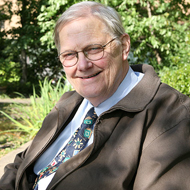
Prof Bryan Clarke helped unravel genetic variation and speciation
One of the world's most influential figures in our understanding of evolution, has died.
For more than four decades, Professor Bryan Clarke FRS, Professor Emeritus in the School of Life Sciences at The University of Nottingham, made fundamental contributions, both empirical and theoretical, to our understanding of genetic variation and speciation.
He was co-founder and trustee of the charity The Frozen Ark, which preserves, in the form of DNA and cell lines, the genetic material of endangered animals, to allow future scientific study.
He was also an inspirational mentor and role-model for younger scientists in evolutionary genetics.
Born on June 24, 1932, and following service in the Royal Air Force, Bryan was educated at Magdalen College Oxford, from where he received both his BA in 1956 and DPhil in 1961.
From 1959 to 1971 he worked at the University of Edinburgh. In 1971 he was the Foundation Professor at the new Department of Genetics at The University of Nottingham, and remained until 1997, when he became Professor Emeritus.
The Darwinian theory of evolution by natural selection identified genetic differences in populations — polymorphisms, as the key to evolutionary change. It is of fundamental interest whether polymorphisms are affected by natural selection, or solely by genetic drift.
Bryan’s research focussed on polymorphisms in snails, including members of the genus Cepaea, the shells of which vary greatly in colour and in their banding patterns.
While some had naively suggested that this variation might have no effect on the organisms’ fitness, earlier experiments and observations, from Cain and Sheppard in particular, had demonstrated that these variants were indeed subject to natural selection.
But, if there is selection operating on this genetic variation, why does the population not come to consist of only a single, best-adapted, type? The answer is that selection can, in some circumstances, maintain variation rather than destroying it.
Bryan was able to demonstrate that polymorphisms in snails are maintained by frequency-dependent selection. That means the fitness of genetic types increases if their frequency in the population diminishes, in turn creating a stable equilibrium in which multiple genetic types are maintained.
He was one of the main advocates of the view that a large part of the evolutionary changes in the amino acid sequences of proteins were indeed driven by Darwinian natural selection. Results from large-scale DNA sequencing in many species are now confirming this.
Bryan also played a large part in developing our understanding of the process through which species form through his long-term study of the land snail Partula on the South Pacific island of Moorea and neighbouring islands.
Through his diverse achievements, Bryan was a great mentor and role-model for younger scientists in evolutionary genetics, and supervised more than 30 research students, at least six of whom are now professors.
He was a co-founder of the very successful Population Genetics Group, a meeting for population geneticists from the UK and Europe that has been running for almost 50 years.
In 1982 he was elected as Fellow of the Royal Society, in 2003 Bryan became an International Member of the American Philosophical Society, and in 2004 he became Foreign Honorary Member of the American Academy of Arts and Sciences.
He was presented with the Linnean Medal for Zoology in 2003, the Darwin-Wallace Medal of the Linnean Society in 2008, and the Royal Society’s Darwin Medal in 2010.
Bryan, who died on February 27, leaves his wife Ann, son Peter and daughter Alex.



 The veterinary mental health charity Vetlife is inviting the veterinary community to join it for a sponsored cold-water dip.
The veterinary mental health charity Vetlife is inviting the veterinary community to join it for a sponsored cold-water dip.